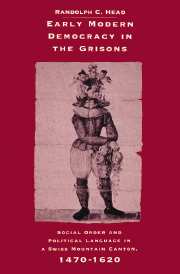 Early Modern Democracy in the Grisons
Early Modern Democracy in the Grisons Book contents
- Frontmatter
- Contents
- List of illustrations
- List of tables
- Acknowledgments
- Note on languages, orthography, and translations
- Abbreviations
- INTRODUCTION: Social order, politics, and political language in Graubünden, 1470–1620
- 1 Communalism and other political models in Europe and in Graubünden
- 2 Graubünden to 1520: geography, society, history
- 3 Local practice and federal government in the Freestate
- 4 From consolidation to communal politics: the Freestate, ca. 1530–1580
- 5 Elite power and popular constraint in sixteenth-century Rhaetia
- 6 Reform, communal action and crisis, ca. 1580–1639
- 7 Political language and political cosmology during the crisis years
- CONCLUSION: Democracy in early modern Graubünden
- Bibliography
- Index
- CAMBRIDGE STUDIES IN EARLY MODERN HISTORY
5 - Elite power and popular constraint in sixteenth-century Rhaetia
Published online by Cambridge University Press: 14 October 2009
- Frontmatter
- Contents
- List of illustrations
- List of tables
- Acknowledgments
- Note on languages, orthography, and translations
- Abbreviations
- INTRODUCTION: Social order, politics, and political language in Graubünden, 1470–1620
- 1 Communalism and other political models in Europe and in Graubünden
- 2 Graubünden to 1520: geography, society, history
- 3 Local practice and federal government in the Freestate
- 4 From consolidation to communal politics: the Freestate, ca. 1530–1580
- 5 Elite power and popular constraint in sixteenth-century Rhaetia
- 6 Reform, communal action and crisis, ca. 1580–1639
- 7 Political language and political cosmology during the crisis years
- CONCLUSION: Democracy in early modern Graubünden
- Bibliography
- Index
- CAMBRIDGE STUDIES IN EARLY MODERN HISTORY
Summary
Oh, it's pointless to deal with our big shots, and it won't get better unless we start another tumult and lop off all of the big shots' heads.
Protocol of the Chadè, 1576Wealthy and powerful families came to dominate the political life of the Rhaetian Freestate during the sixteenth century, filling the void left by the extinction or marginalization of the feudal dynasts. These families increased their influence by means of tactics common to patricians all over early modern Europe, such as patronage networks, control of public offices, and education in the law, although they adapted their methods to the decentralized structure of the Freestate. In many respects, they represent no more than a local variation on phenomena that could be found in other regions at the time. Unusual, however, were the nature and extent of the constraints on the Rhaetian elite. Whereas non-feudal patricians in Europe's monarchies and principalities faced competition from the hereditary nobility and distrust from their princes, and even the Swiss patriciates were limited primarily by factional divisions among themselves, the Rhaetian grosse Hansen repeatedly saw their power swept away by populist unrest. Both the political culture of the Freestate, with its emphasis on communal rule, and the demonstrated willingness of common Rhaetians to seize control of the Freestate's institutions set limits on the dominant group.
Like all power struggles, this one took place on several levels simultaneously. Individuals and families competed for the resources essential for power, such as land, money, education, and prestige.
- Type
- Chapter
- Information
- Early Modern Democracy in the GrisonsSocial Order and Political Language in a Swiss Mountain Canton, 1470–1620, pp. 135 - 167Publisher: Cambridge University PressPrint publication year: 1995


